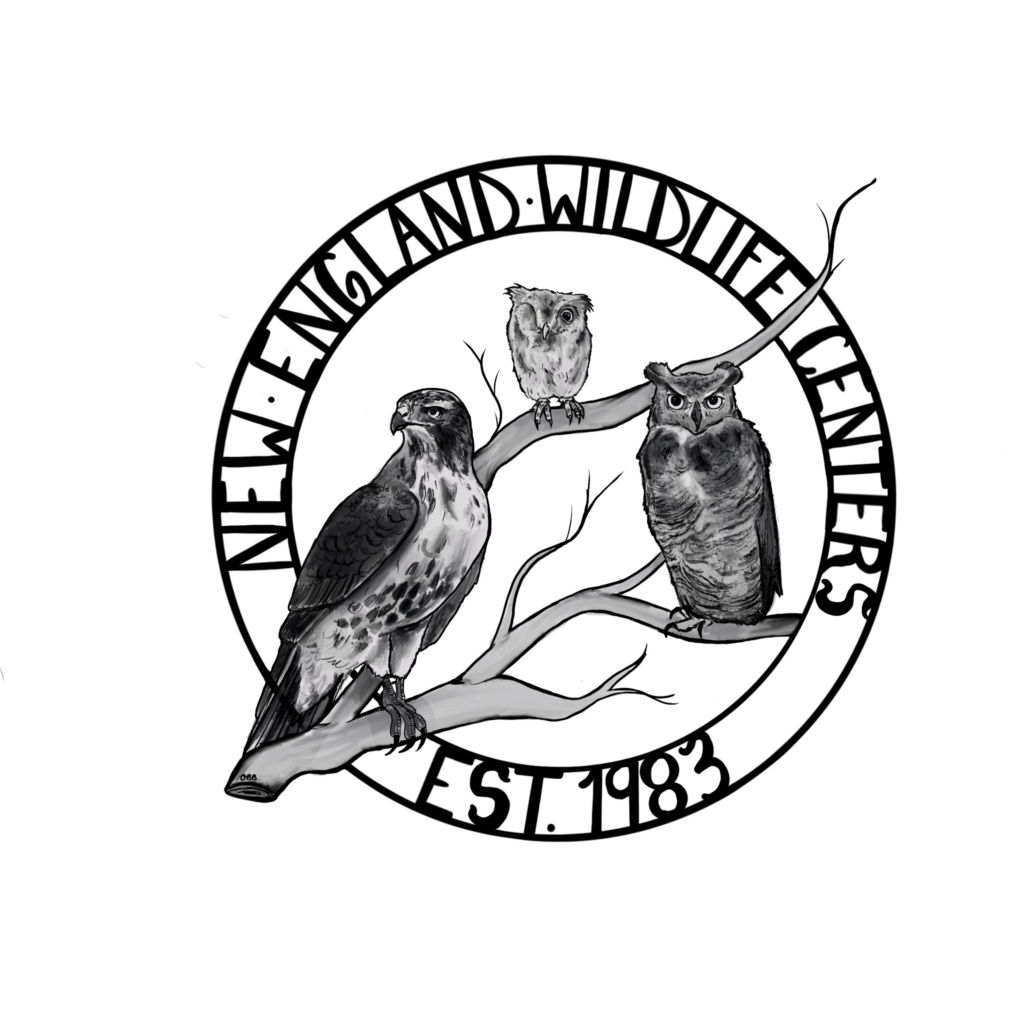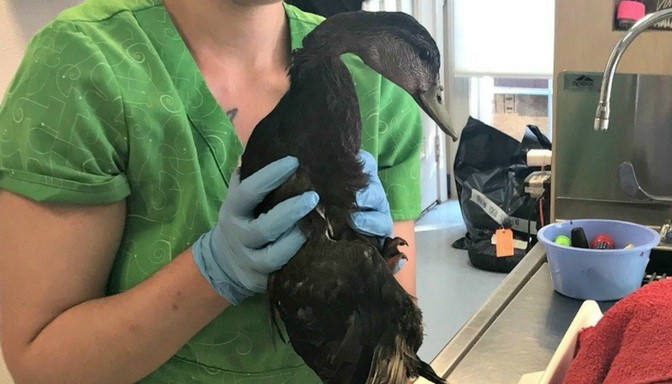How NEWC wildlife veterinarians help animals recover and return to the wild
Earlier in August, a fishing vessel sank in New Bedford harbor and started leaking diesel fuel. The US Coast Guard and the Department of Fish and Wildlife brought more than a dozen seabirds and ducks to our affiliate Cape Wildlife Center (CWC) in Barnstable where our veterinarians could provide emergency care to oil-covered animals.
You can read more about the wildlife emergency response effort on our blog post, “NEWC Veterinarians Responding to Diesel Spill in New Bedford.” Today, the remaining birds are all at our affiliate CWC to get daily swim time in CWC’s salt water pool. They are doing reasonably well and we hope to return them to the wild in a couple of weeks.
After the fuel leak, many of you posted questions on Facebook, sent in them in via email, or asked while visiting our wildlife hospital. You wanted to know more about how we care for animals affected by an oil spill and what the impact is on local habitats when petroleum leaks into the environment.
Thank you for asking! We very much appreciate the chance to help more people learn about how to help wildlife and preserve nature!
With all the coverage of the destruction from Hurricane Harvey and concerns about potential fuel leaks from pipelines in the Houston area, we thought now was an important time to share answers to your questions.
Dr. Rob Adamski, NEWC’s lead wildlife veterinarian, and Dr. Priya Patel, NEWC’s wildlife veterinarian at our affiliate CWC, sat down with us to answer your questions. Here’s what they had to say.
It looked like the birds that came from New Bedford harbor had burns on their skin. How do you treat the burns after the initial bathing?
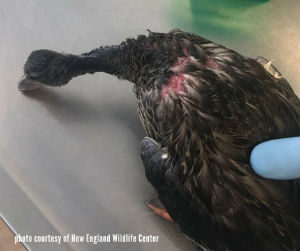 Dr. Adamski: Washing the petroleum product off the bird stops the chemical burns. We also give birds pain and anti-inflammation medication to help make them comfortable.
Dr. Adamski: Washing the petroleum product off the bird stops the chemical burns. We also give birds pain and anti-inflammation medication to help make them comfortable.
Dr. Patel: In addition to the pain medications, we can treat the skin with aloe. We also provide extra hydration as burns tend to dehydrate the patient. We use antibiotics to help treat any secondary bacterial infections that could occur because the protective skin barrier is broken.
Treating burns on seabirds can be very difficult because we don’t want ointment to hinder the waterproofing process.
Does Dawn dish soap really clean the grease off the birds, as illustrated in their commercials all these years?
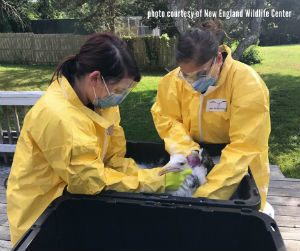 Dr. Admaski: Yes, it’s gentle on their feathers and does remove most of the contaminants. We adjust the concentration of soap and water accordingly. It does take a lot of washing to remove petroleum from feathers, though.
Dr. Admaski: Yes, it’s gentle on their feathers and does remove most of the contaminants. We adjust the concentration of soap and water accordingly. It does take a lot of washing to remove petroleum from feathers, though.
Dr. Patel: Yes, not all oils are removed by Dawn. Sometimes a pre-treatment technique is required before the wash with Dawn. A trial wash is performed with a plucked oiled feather to see what concentration of Dawn is required to get the feather clean.
Besides washing the birds, we administer fluids to keep them hydrated and flush their stomachs of any oil. We also give a stomach protectant to line the stomach and prevent against ulcers that might be caused by ingesting the oil.
Once you have an animal in your care after an oil spill, how long does it take for the bird’s water-repellent coat to return?
Dr. Adamski: It can take 1-2 weeks for the waterproofing to come back and up to a month for the animal to fully recover from exposure to toxins. The length of time depends on how severe the exposure was and extent of injuries the animal sustained from the spill.
Dr. Patel: Yes, it depends on how damaged the feathers were by the contaminant. Ideally you only want to wash the bird once because it is a very stressful process – but a necessary one for their survival. After the initial wash, the animal may not be fully waterproofed and the next step is to frequently spritz the patient with water to encourage the bird to preen its feathers.
The process of preening will help the feather become waterproofed by spreading the natural waterproofing oils produced by the bird. All of the birds in this current spill only needed to be washed once and were fully waterproofed within the following week.
For animals with fur like otters or raccoons, how do you treat them? Soap bath and what else?
Dr. Adamski: The receive the same treatment as birds. They are washed in a soap and water concentration. They are giving pain medication and anti-inflammatory medicine. They are also given charcoal and other medicines which act like a band-aid for the GI tract, preventing the further absorption of toxins into the animal’s system.
How well do animals generally recover after treatment? Can they recover on their own if you don’t find them right away after an oil spill?
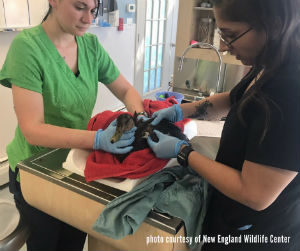 Dr. Admaski: Depending on how significant their exposure was to the toxins in petroleum, animal who receive human help can survive. Again, it depends on how much they were exposed to toxins on the likelihood that they could survive on their own.
Dr. Admaski: Depending on how significant their exposure was to the toxins in petroleum, animal who receive human help can survive. Again, it depends on how much they were exposed to toxins on the likelihood that they could survive on their own.
Animals covered in oil or fuel cannot maintain their body temperatures. They will freeze to death. If animals try to clean themselves off, they ingest the oil’s toxins, which they are also absorbing through their skin. The toxins build up in their systems and poison them.
Dr. Patel: As with wildlife rehabilitation in general, success can vary. We were able to successfully wash and rehabilitate more than half of the birds from New Bedford harbor. An animal’s survival rate is probably increased with medical attention generally speaking.
I read somewhere that this treatment does not really save the animals since the damage is already done. Is this correct?
Dr. Adamski: Depending on the extent of an animal’s injuries and how quickly they receive help, animals do survive after treatment. There is significant research that animals injured in an oil spill no longer reproduce. So from an animal welfare perspective, they do live, but they may experience permanent changes to their reproduction.
Dr. Patel: Birds can suffer lasting effects from oil spills externally and internally. They tend to ingest some of the oils and this can affect their stomachs as well. We do the best we can to try to flush the oil from their stomach by giving them an electrolyte solution orally several times a day.
When animals are ready to go back into the wild, do you release them back into the same area or place? What if the oil is still there?
Dr. Adamski: We re-settle them in a good habitat for their species in an area as close as possible to where they came from originally.
Dr. Patel: While we would probably not release them back into the same spot as the oil spill, we find a suitable environment to release birds. They can then choose to fly away and find a new home if it’s not to their liking.
What about other “wildlife” like clams and mussels and fish. How do they respond and do they recover?
Dr. Adamski: A petroleum spill or leak damages the ecology of a habitat and can compromise the entire ecosystem of an area, depending on the extent of the spill or leak. Marine life and wildlife at every level can be affected. It can take a significant amount of time for the environment to recover.
What happens to the local habitat? How is it affected by an oil spill or leak?
Dr. Adamski: The National Oceanic and Atmospheric Administration (NOAA) has a good description of what happens to animals and plants in marine environments after an oil spill at response.restoration.noaa.gov/oil-and-chemical-spills/oil-spills/how-oil-harms-animals-and-plants-marine-environments.html.
Human intervention can help the local habitat recover. NOOA has some very helpful information about how they manage the environmental impact of an oil spill at oceanservice.noaa.gov/facts/spills-cleanup.html.
If someone sees oil or grease on a pond or river or brook, when should it be reported and to whom should it be reported?
Dr. Adamski: Probably the best way to answer this is if it is alarming to you, you should report it. Call 911 to report the spill in local fresh water. For the ocean, contact NOAA. State and federal resource management agencies can assess the situation and determine the appropriate response.
Want to Learn More About Wildlife?
New England Wildlife Center is open to the public, 10 am – 4 pm, 7 days a week, all year long. You can look through the observation windows at our wildlife hospital to see animals receiving care. You can also learn about local habitats in our Weezie Nature Center and by walking along our outdoor nature trails.
To get the latest updates on wildlife receiving care at NEWC and other educational information, follow us on Facebook or subscribe to our Wild Update email list.
